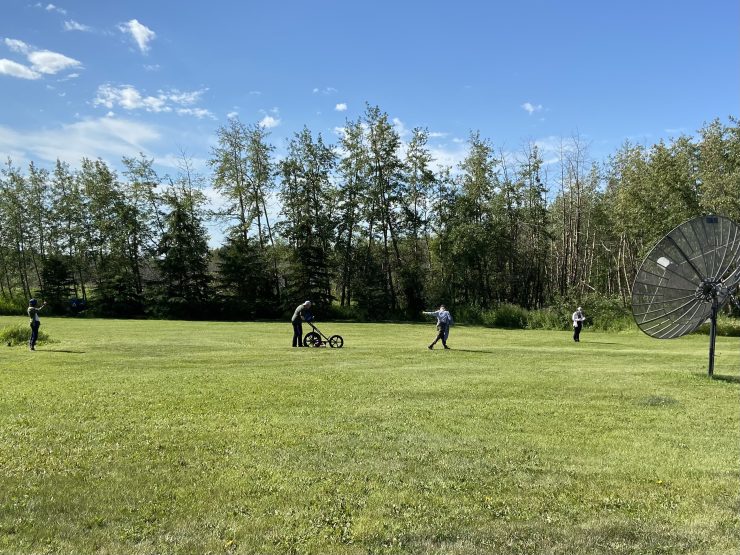A ground-penetrating radar search for unmarked burial sites is underway at University nuhelot’ine thaiyots’i nistameyimâkanak Blue Quills near St. Paul, Alta.

The university was once a former Indian residential school.
“This is Phase 1 of what we anticipate will be a very long process of searching for the unmarked burial sites,” said Sherri Chisan, the president of University nuhelot’ine thaiyots’i nistameyimâkanak Blue Quills.
“For many years, our people have been sharing their memories that they know there were burials that happened here.”
Preparations have been underway since May 2021 to search the area.
This phase of the search started Tuesday will last for five days, covering a couple of acres — just a small portion of the site.
“This is work that’s not going to finish in the five days that we’re here — it’s only a beginning,” said Kisha Supernant, director of the Institute of Prairie and Indigenous Archaeology at the University of Alberta.
READ MORE: Alberta First Nation investigating human remains found near residential school site

Get breaking National news
Ground-penetrating technology is just one piece of the search — stories from survivors are important parts of the process too.
“Hopefully a ground search will reveal some truth and information that was hidden from us for many years,” residential school survivor Louis Lapatack said. He was a student at Blue Quills for 13 years.
For the past 50 years, the now university has been a place of learning and healing.
- Latest alleged Iranian regime official found in Canada wants his identity hidden
- Why Canadian beer cans are ‘almost impossible’ as tariffs near 1-year mark
- Jivani’s trip to Washington has some Conservative MPs scratching their heads
- Canada’s new Greenland consulate officially opens with patriotic ceremony
The school is run by seven First Nations and is the first of its kind in the country.
“In 1970, when our ancestors, our parents and our grandparents decided to take over the school, they did it so that there would be a place where our people could learn in an environment that was culturally aligned,” Chisan explained.
“We’ve seen that this has helped all of us — staff and our students alike — to be able to reclaim the space and turn it into something positive for future generations.”
As the search outside continues, the emotions it brings up are complex.
“The tragedy that children died at school and were buried without their parents knowing about it — it’s deep sadness,” Chisan said.
A report on the findings is expected to be ready mid-winter.
“This work is extremely difficult to do. It is very emotional. It is very heavy,” Supernant said.
“We might be finding the graves of children and that is always very heartbreaking work. At the same time, we want to do it with the best possible science.”
Survivors of the residential school system can get support through Canada’s Indian Residential Schools Resolution Health Support Program 24-7 crisis line by calling 1-866-925-4419.








Comments